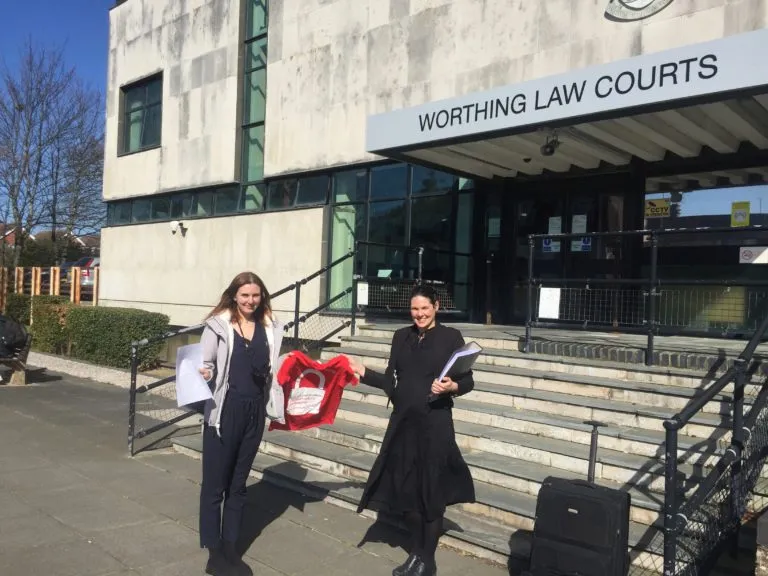Third court declaration in a year for Shelter over unlawful ‘No DSS’ policies
Published: by Rose Arnall

For the third time in 12 months, a UK court has declared DSS discrimination to be unlawful. The case was Hayley Pearce v Michael Jones & Company and Ms Valerie Quick (2021).
On Monday 29 March at Worthing County Court, Deputy District Judge Byfield declared by consent that Michael Jones & Company estate agents had unlawfully discriminated against our client, single mum and freelance writer Hayley Pearce, by telling her that ‘people in receipt of benefits would not be acceptable’ to the landlord. Because Hayley is a woman, this simple rejection constituted unlawful indirect discrimination on the grounds of sex under the Equality Act 2010.
Hayley’s story
Hayley is 32 and lives in Sussex with her son. She lived in her previous home for just over a year and paid the £995 rent in full, on time every month. She’s always been a reliable tenant and has a very good rental history.
Back in 2019, her landlord increased her rent to well above the Local Housing Allowance (LHA) rate, which Hayley couldn’t afford. She unsuccessfully challenged the rent rise. Her landlord served her a Section 21 ‘no-fault’ eviction notice to leave by the beginning of July 2019, so she had to look for a new home. But it was then that she came up against repeated ‘No DSS’ discrimination.
Hayley had savings, a home-owning guarantor, and 13 years’ good rental history. She works part-time and receives Universal Credit and Child Benefit. Her annual income is similar to the average in her local region, she was able to pay rent in advance, and had enough money for a rental deposit. But for some local lettings agents, all of this wasn’t enough.
In May 2019, she started scouring lettings websites for a suitable property. She phoned Michael Jones & Company to find out about a flat it was advertising for £825 per month. But when she said that part of her income came from benefits, she was told by a (now former) staff member that people in receipt of benefits would not be acceptable to the landlord.
Hayley felt nervous that she wouldn’t find a place for her and her son to live before her notice period ended. She felt humiliated by the staff member’s treatment and was being knocked back by several other letting agents. So she got in touch with us.
Hayley’s legal cases
Hayley’s case against Michael Jones & Company is one of three she has taken on in the last two years, and the only one to reach the stage of a final hearing at court. The other two settled long before trial, and collectively paid Hayley damages and legal costs of almost £15,000 in total. In one of these two cases, the landlord of the property Hayley wanted to view said she had no idea that her agents were refusing to help people receiving benefits.
But her case against Michael Jones & Company went all the way to the day of trial. It was only at the door of Court that an agreement was reached. By consent, Deputy District Judge Byfield declared that:
‘The First and Second defendants unlawfully indirectly discriminated against the claimant on the ground of sex contrary to section 19 and 29 of the Equality Act 2010 when the first defendants former trainee informed the claimant that people in receipt of benefits would not be acceptable to the second defendant.’
In addition, Michael Jones & Company and the landlord agreed to pay Hayley damages of £4,500 and her legal fees – as well as their own legal costs for the case, which ran for two years.
Our solicitor Rose Arnall, and barrister Tessa Buchanan at Garden Court Chambers represented Hayley. Her case against Michael Jones & Company is her third success in challenging sex discrimination, and another important nail in the coffin for DSS discrimination.
Where is Hayley now?
Fortunately, Hayley did find a landlord who accepted tenants on benefits and moved into her current home at the end of June 2019. But she was scared she wouldn’t be able to find a suitable home and was made to feel like a ‘second-class citizen’ because she receives benefits. She felt strongly about taking on the letting agents who discriminated against her, which is why she approached us for help.
No DSS: the facts
Sadly, Hayley’s experience with letting agents is not a one-off. Rejections of applicants just because they receive benefits are rife and particularly disadvantage women, who are more likely to need to claim housing benefit than men. Our research shows that 41% of female single-adult households renting privately claim housing benefit, compared to just 27% of male single-adult households. This means that women are in some cases 1.5 times more likely to rely on housing benefit than men, so they’re more likely to be excluded by a No DSS criterion.
No DSS also disproportionately affects other groups who are more likely to need to claim benefits. For example, in the UK, Bangladeshi households are twice as likely, and Black households 1.7 times as likely to claim housing benefit than white households. Disabled people are also between three and five times more likely to claim housing benefit than non-disabled people.
After three declarations by the courts and countless other successful settlements for our clients, the law is in our view clear. But the huge power imbalance between private renters and letting agents means DSS discrimination often goes unchecked.
We want renters’ reports of ‘No DSS’ to be listened to and acted on. That’s why we’re calling for a new private renting regulator which can work proactively to make law-breaking agents and landlords change their ways. We will keep fighting discrimination in housing until it’s stamped out for good.